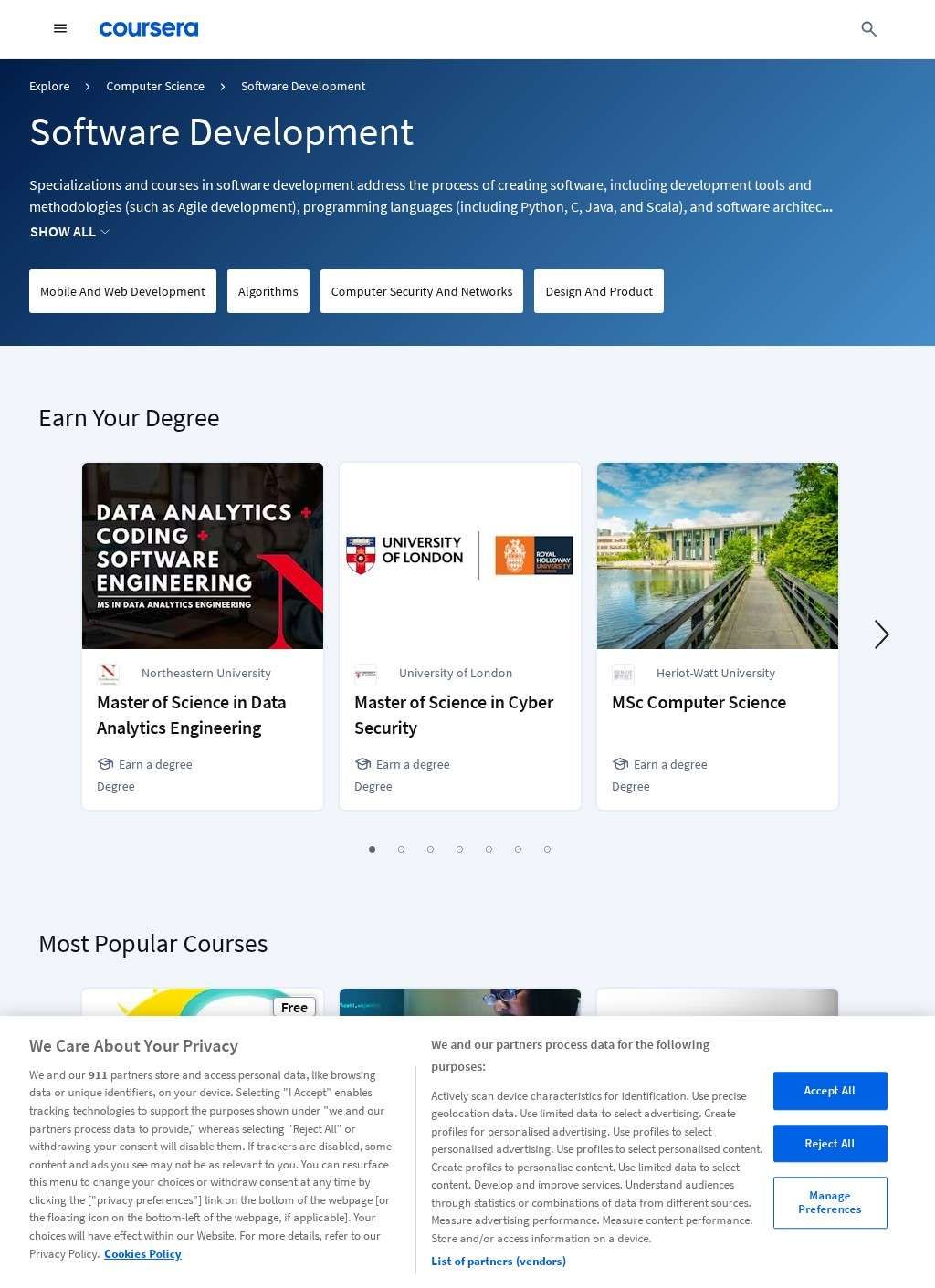Coursera Software Development Courses operates as one of the world's premier online education platforms, providing access to university-quality programming and software engineering education from top-tier institutions and leading technology companies. The platform democratizes access to high-caliber technical education by offering courses developed by prestigious universities including Stanford, MIT, and Carnegie Mellon, alongside industry-leading companies such as IBM, Google, and Amazon. This unique combination of academic rigor and industry relevance ensures learners receive both theoretical foundations and practical skills that translate directly to professional success.
The course catalog encompasses the full spectrum of software development disciplines including web development, mobile application development, data science, machine learning, cloud computing, and software engineering fundamentals. Students can choose from individual courses for specific skill development or comprehensive specializations and professional certificate programs that provide complete career preparation. The breadth of offerings accommodates learners at every level, from absolute beginners taking their first programming steps to experienced developers seeking advanced specializations in emerging technologies.
University partnerships bring world-class academic instruction to global audiences through carefully structured curricula that maintain the rigor and depth of traditional computer science education. Courses feature video lectures from renowned professors, peer-graded assignments, and capstone projects that demonstrate mastery of complex concepts. The academic approach ensures thorough understanding of underlying principles that enable learners to adapt to new technologies and solve novel problems throughout their careers.
Industry-developed programs provide direct pathways to employment through professional certificate programs designed by major technology employers. These programs focus on immediately applicable skills and include real-world projects that simulate workplace challenges. Companies like Google, IBM, and Facebook have created specialized tracks that prepare learners for specific roles within their organizations, often including direct recruiting pipelines for successful graduates.
Flexible learning accommodations enable working professionals and students to progress at their own pace while maintaining other commitments. Courses offer various scheduling options including self-paced study, structured timelines with deadlines, and live sessions for interactive learning. This flexibility makes quality education accessible to individuals who cannot commit to traditional full-time educational programs while still providing structure and accountability for successful completion.
Professional networking opportunities emerge through peer interactions, study groups, and alumni communities that span global technology industries. Students collaborate on projects, share knowledge, and build professional relationships that often lead to job opportunities and ongoing career support. The diverse, international student body provides exposure to different perspectives and approaches that enrich the learning experience while building valuable professional networks.
Assessment and credentialing systems ensure learning outcomes meet industry standards through rigorous evaluation methods including programming assignments, peer reviews, and comprehensive final projects. Certificates and course completions are recognized by employers and can be displayed on professional profiles and resumes. Some programs offer university credit or pathways to degree completion, providing additional academic value for learners seeking formal educational credentials.
Hands-on project experience forms the core of most software development programs through practical assignments that require building functional applications and solving real-world problems. Students work with industry-standard tools and development environments while creating portfolio pieces that demonstrate their capabilities to potential employers. These projects often involve collaboration with other students, mimicking professional development team dynamics and building essential teamwork skills.
Technology coverage spans both foundational programming languages and cutting-edge frameworks that reflect current industry demands. Students learn established languages like Python, Java, and JavaScript alongside modern frameworks and tools including React, Node.js, Docker, and cloud platforms. This comprehensive technology exposure ensures graduates can contribute to diverse development projects and adapt to rapidly evolving technology landscapes.
Career development support includes resume building guidance, interview preparation, and job search strategies specifically tailored to software development careers. Many programs include career counseling services and connections to hiring partners that actively recruit from Coursera's graduate pool. The platform maintains relationships with technology companies seeking skilled developers, creating direct pathways from education to employment for successful students.
Affordability and financial accessibility features include free access to course content, income-based payment plans, and financial aid programs that reduce barriers to quality education. Many courses can be audited at no cost, while certificates and specialized programs offer flexible payment options including monthly subscriptions and installment plans. Coursera's commitment to educational accessibility ensures that financial constraints don't prevent motivated learners from accessing world-class software development education.
Quality assurance and continuous improvement processes ensure course content remains current with industry trends and technological advances through regular updates, instructor feedback, and learner outcome analysis. The platform monitors completion rates, employment outcomes, and employer satisfaction to continuously refine programs and maintain their effectiveness. This commitment to quality ensures that time invested in Coursera programs translates to tangible career advancement and professional success in the competitive software development job market.
